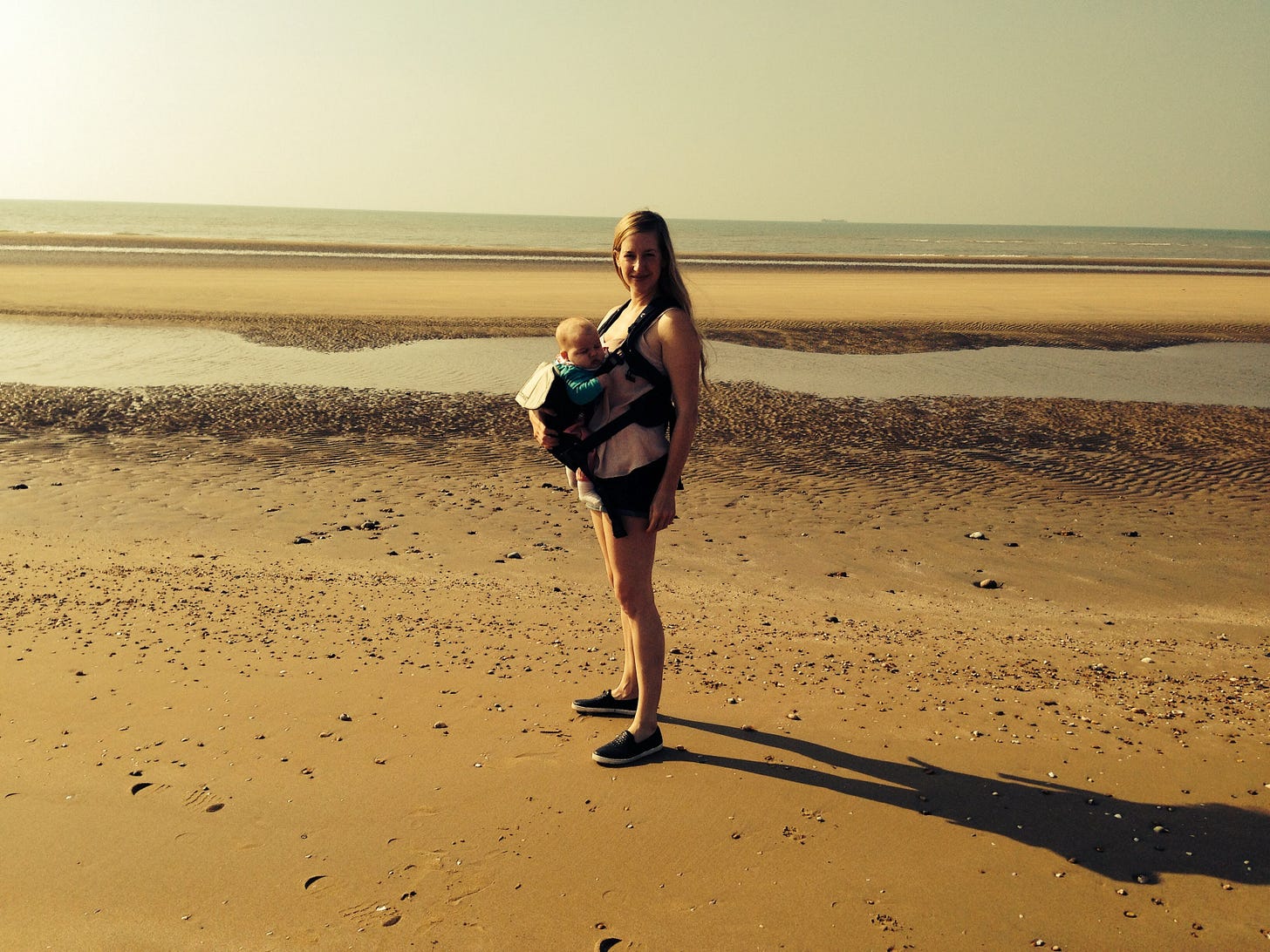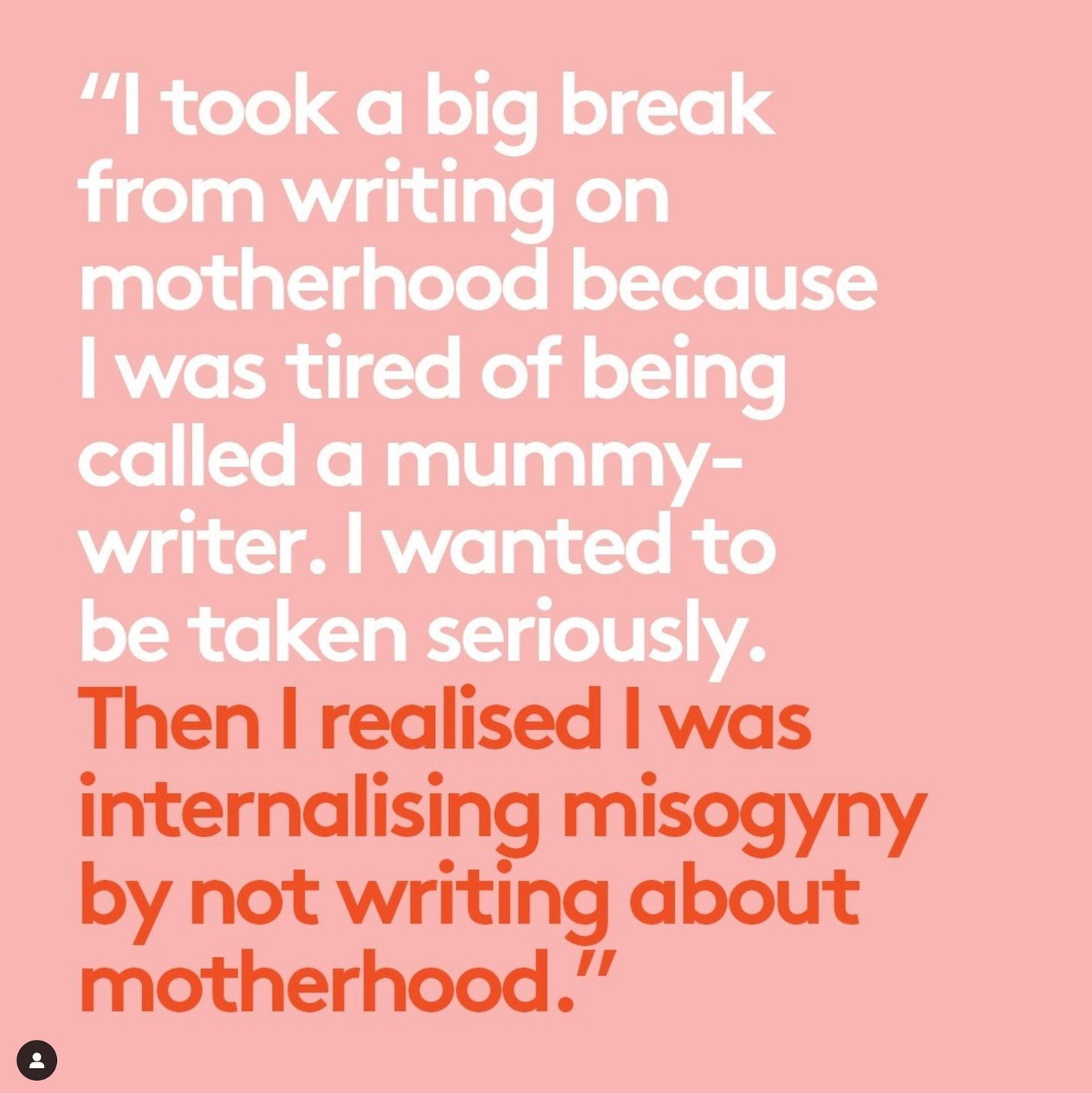When I was pregnant with my first baby, in 2013, I was invited to speak live on radio about feminism. At the time, this was my ‘niche’ as a journalist.
In the break, one of the women interviewing me said: Do you think your journalism will become about motherhood, after you’ve had your baby?
No way, I said. I’ll continue to write about sex work and porn, trafficking, body image, the objectification of women and the male gaze.
I couldn’t believe she’d asked. I felt panicked that suddenly, all I’d be seen as was a ‘mother’. What about everything else I’d worked for?
But then I gave birth and my entire world shifted.
I was so very much in love with my new baby from the moment I met her, but I also quickly started to see how mothers are thought of as ‘less’.
How I had seen mothers as less (very embarrassingly) before becoming one myself.
Raising an eyebrow when women left work on time to collect their children from childcare; allowing men in a newsroom to make jokes about a woman slacking off as she snuck out to collect her kids.
I had been sucked into a misogynistic, patriarchal workplace that said: mothers are not welcome here, go home and stay home.
Reader, I became a mother who was told to go home and stay home, when I had my baby and the tech company I worked for terminated my contract.
But whatever I had thought - and perhaps still did - about mothers and motherhood, I’d find these poems dropping in about my motherhood experience.
I needed to process it, commit it to paper, share it.
I wanted to share my own experience of motherhood, while also shining a light on both universal experiences and those that don’t usually get airtime.
So I launched a platform, The Early Hour, to do all of the above.
But even that platform was for ‘everyone’ not just parents. It was a ‘culture and lifestyle’ digital magazine, not a parenting platform.
I interviewed musicians, writers, DJs, artists, chefs and entrepreneurs who didn’t have kids, or if they did - it wasn’t the focus of their work.
I needed everyone to know there was more to my life - and platform - than just motherhood.
Doubts slipping in
A few years in, I was talking to a friend who ran a magazine publishing the kind of articles I wrote before I became a mum.
I told her that sometimes, I wasn’t sure The Early Hour was helping the conversation in any way.
She said that of course it was; it was helping parents to feel less alone with their fears and concerns, and how their lives had changed since having a baby.
In that moment, I believed her.
But soon after, a fellow writer - not a friend - tagged me in a post on Facebook looking for ‘mummy bloggers’.
I find this term troubling. Infantilising. Patronising.
And I was offended that after completing a journalism Masters, launching my own content platform and writing for the Guardian, Telegraph, Grazia and other publications, I was still seen as a ‘mummy blogger’.
It made me feel small, and embarrassed about the new niche I’d developed.
But I couldn’t stop writing about the motherhood experience, as I was now three kids in and running a business and I had a writing career and found that doing ‘it all’ was both fulfilling and utterly exhausting.
I wrote a passage about the conflicting feelings I had, as a mother - in five minutes, on the Notes section of my phone after dropping my kids at school one morning - and it instantly went viral.
It was shared by Paloma Faith and Busy Philipps, as well as thousands of other women around the world.
This was the mothers - and the Universe - saying: WE NEED TO TALK ABOUT MOTHERHOOD.
We need to be honest and raw and open and thoughtful.
We can’t hide in our homes, flitting between joy and outrage; contentment and frustration.
We need to take to the internet and SHARE.
But when my second book, Shy, came out and I was asked to write a piece about childhood shyness by a national women’s magazine, I declined.
I said this book wasn’t about children (although there is a chapter on childhood shyness and I share my own story from childhood up until now) and that I wanted to write for adults.
And yet many of the grownups who read Shy end up applying what they learn - about reframing shyness; seeing it as an attribute, not a flaw - to their children.
Saying no to writing that article was my way of saying: I don’t just write for and about mothers.
But I wish I had written it. It was a silly mistake. It was a response to the societal message that writing about motherhood is light and airy; not serious and feminist.
And yet it’s rarely light, never airy and almost always has a feminist undertone.
We want to share the magic and beauty of motherhood because it’s a love story. And isn’t love the theme of all the greatest literature?
We want to share the darkness: the loneliness, inequality and injustices so that we feel a sense of solidarity.
There’s no market for motherhood poetry
A couple of years ago, a major publishing house was interested in publishing a book of my motherhood poems.
I put together a large collection, we decided on a name and I was so excited to work on this project together.
But a few months in, I got an email saying: I’m really sorry but the sales team have changed their mind. They don’t think there’s a market for motherhood poetry.
No market for it?
What about the estimated 2.2 billion mothers around the world?
Or the fathers attached to those babies?
Or those without their own children but who were born to a mother?
How about we make a market for it by publishing books on motherhood and marketing them as books for everyone?
Herein the problem lies
Earlier this week I saw this post on the @hellolunchlady Instagram account:
It’s by @katejbaer; mother, poet, author, truth-teller.
And I thought: shit, that’s what I’ve done too.
At points, it’s been intentional.
I no longer run The Early Hour, I don’t pitch articles on motherhood, I’ve shifted the subjects I write books on from having a motherhood focus (like my first book The Freelance Mum) to being for all women.
But reading that quote also made me realise I’ve stopped documenting my motherhood experience online as much for exactly the same reason:
I’ve internalised the message that writing about motherhood is ‘less’.
Less interesting, less important, less intellectual.
Interestingly, though, the private messages I’ve received that have meant more to me than anything else have been those about how I am, as a mother.
Those messages really stay with me.
My ‘love language’ is words of affirmation and when someone tells me I’m doing a good job of raising my kids, I feel HIGH.
Another reason I write less about motherhood
As my children get older (they are now approaching nine, six and four), I’m regaining my independence and I have many interests that have nothing to do with motherhood.
So to open up my writing makes sense; I’m not deep in the heady early months with a newborn now - and I never will be again (sadly, I love newborn babies).
But I have started to re-share some of my early motherhood poetry on Instagram, like this poem that went viral the first time I shared it.
I want to feel proud of my experience and to publish it not just so that other mothers can read it and feel less alone but also so that everyone can have a deeper understanding of what motherhood entails.
It is interesting, important and has the potential to be intellectual.
So if you write about it, do it proudly.
If you don’t - but want to - start.
And whether you’re a mother or not*, a woman or not, you might like to consider reading about it in the same way you choose other topics to read about.
As one of the many big life experiences that deserves to be documented in words.
Thank you for reading.
Love,
Annie x
* I want to acknowledge that I understand reading about motherhood can be incredibly painful for those who want to become mothers and can’t, or who have lost a baby or child. For those who have experienced this type of loss, I’m deeply sorry.





Thank you for writing this so honestly Annie. I sometimes feel like I'm getting pigeon-holed - and know other artists/writers who do too, by referencing motherhood in our work, its like that is then all we can write/talk about. I know many who feel they have to make work on other themes or areas of their lives to be taken 'seriously'. Including motherhood shouldn't be seen as some kitsch 'niche' category you are either on board with or not. The point you make that we often stop ourselves for fear of this really resonated with me. Also recognising the issues in all of that, as you do so brilliantly here, is really encouraging for me.